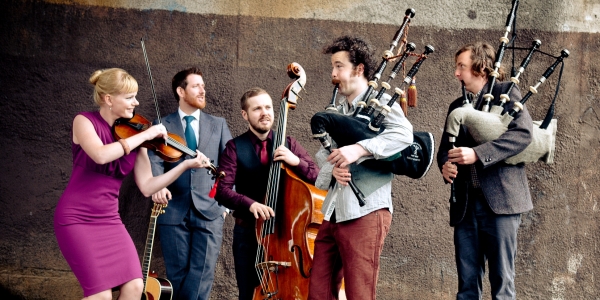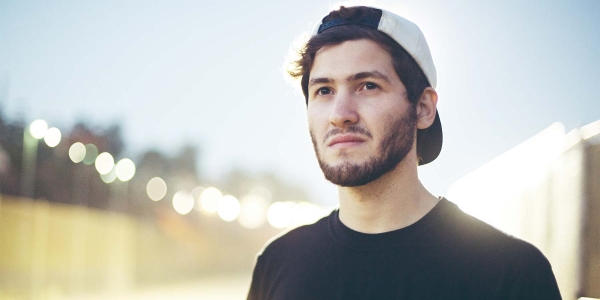Ùrlar, the new record from Glasgow-based quintet Breabach, exhibits this compound of the local and the enduring. Ahead of the album’s Australian release, fiddle player Megan Henderson explains that the band members returned to their assorted hometowns to source ideas for the record. “The word ‘Ùrlar’ literally translates as ‘ground’ or ‘foundation’,” she says. “Our basis of what we set out for, we were all going to go back to our roots to collect some material, or write some new material, but [to] have a bit of inspiration from folk back home.”
Perhaps Breabach’s most distinctive feature is a jaunty use of bagpipes, but Ùrlar isn’t stylistically limited. The record is split between instrumentals and songs featuring vocals from one of the band’s three singers (Henderson, bagpipe/bouzouki player Callum MacCrimmon and guitarist Ewan Robertson). There’s vocal harmonies sung in Scottish Gaelic, traditional country leanings and even some foreboding medieval sounds. “It’s quite varied,” says Henderson, “and it’s good because it’s got a little bit of all of us in it. There’s a lot of our own material in it this time, music that we’ve all written.”
In recent years ‘folk’ has become a marketing buzzword, reaching a point where basically anyone handling an acoustic guitar can be tagged a folk singer. Sure, folk artists do primarily play acoustic instruments, but ‘folk’ and ‘acoustic’ are by no means synonymous. Anyhow, despite Breabach’s endeavour to authentically correspond with folk traditions, Henderson isn’t dismissive of the mainstream folkies. “I think it’s great that, whatever these bands are doing, that they’re doing their thing. It might not be the most traditional representation of folk music. There’s so much folk music that you can’t really pinpoint what is or what isn’t folk music. Just that people even know the word, that’s pretty cool.”
Breabach’s submersion in the history of Scottish music has earned them accolades such as Folk Band of the Year at the Scots Trad Music Awards in 2012 and support from BBC Radio 2. However, their rising profile hasn’t prompted a commercial sound makeover. “I think we’re all too laidback to be bothered about anything like that,” says Henderson. “We’re just doing our thing and we’ll make a record to showcase what we’re doing. It’s more like a wee archive for ourselves, to look back on what we did.”
Regardless of these modest ambitions, Breabach has been charming audiences around the world for almost a decade now. The group were in Australia just a few months ago and they’ll be back again this week for a range of festival appearances. The quintet’s live show is a highly interactive affair that invites the audience to contribute to the overall experience. “If you want to just sit back and enjoy the music that’s great but if you want to join in on a chorus or two of a song and learn a bit of a Scots song or a bit of Gaelic, a bit of pipe imitation, you can feel free,” says Henderson. “We like to see a good response and have a good rapport with our audience. We don’t really want to go in and just be playing to a brick wall. We want to see that you’re interacting and that the music is getting across to people.”
Indeed, Breabach’s music is a true representation of their country’s folk traditions but, more importantly, it communicates with the folks of today. “We’re all very respectful of traditional music,” says Henderson, “and we all know where we’re from and know our roots and our traditional music. But the music progresses.”
BY AUGUSTUS WELBY







